Company Law BSL305: IRAC Analysis of Company Contracts and Authority
VerifiedAdded on 2022/09/15
|6
|1035
|23
Homework Assignment
AI Summary
This assignment presents an IRAC (Issue, Rule, Application, Conclusion) analysis of a company law problem concerning the enforceability of contracts against a company (Events R Us Ltd). The scenario involves two contracts entered into by different company directors: one for the purchase of a computer program and another for organizing a fashion event. The analysis delves into the relevant legal principles, including Section 124, Section 126, and Section 129 of the Corporations Act 2001 (Cth), as well as the concept of actual, implied, and apparent authority, and the Indoor Management Rule. The assignment evaluates whether the directors had the authority to bind the company to the contracts, considering the company's constitution, the directors' roles, and the knowledge of the third parties involved. The conclusion determines the enforceability of each contract based on the application of these legal principles.
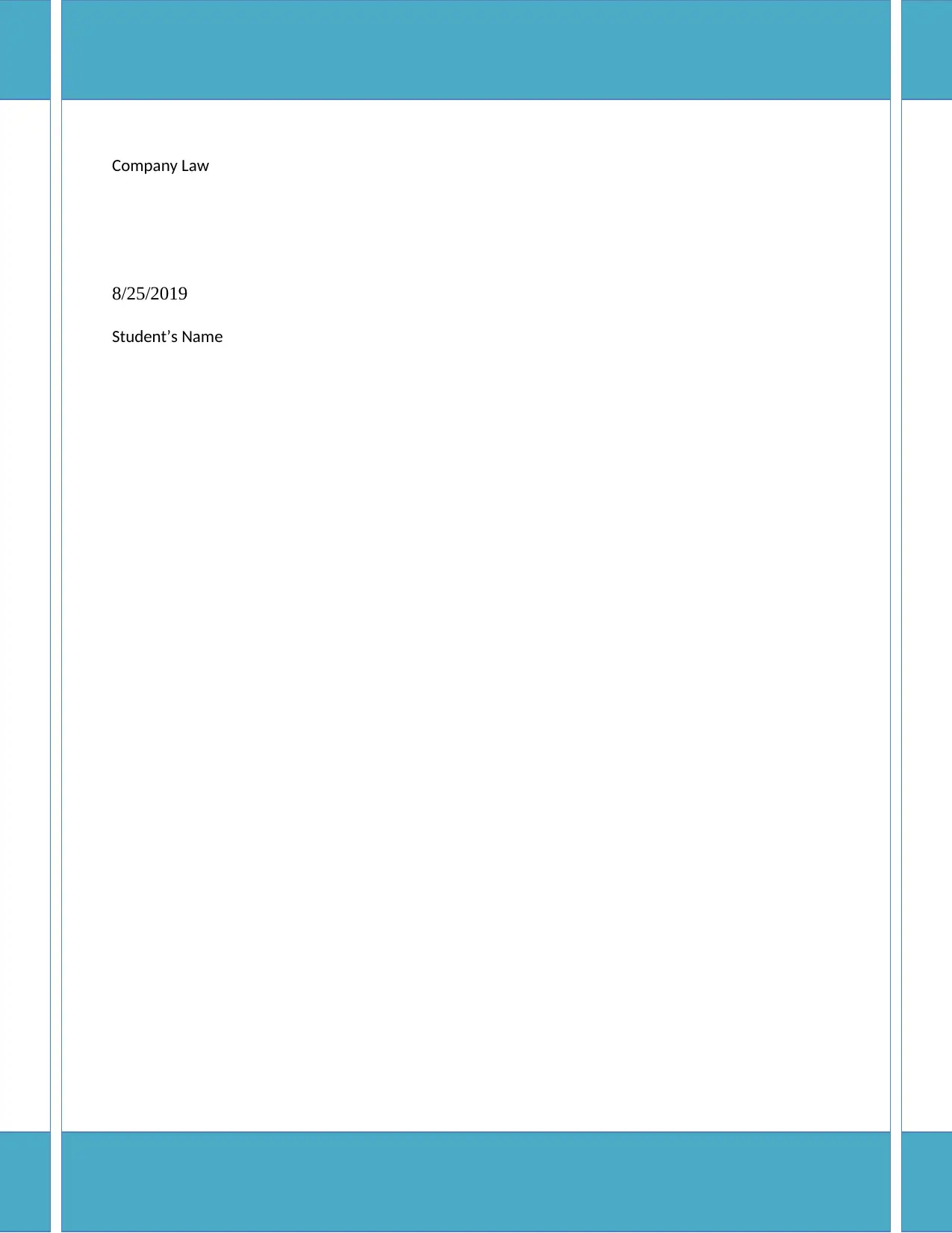
Running Head: Company Law 0
Company Law
8/25/2019
Student’s Name
Company Law
8/25/2019
Student’s Name
Paraphrase This Document
Need a fresh take? Get an instant paraphrase of this document with our AI Paraphraser
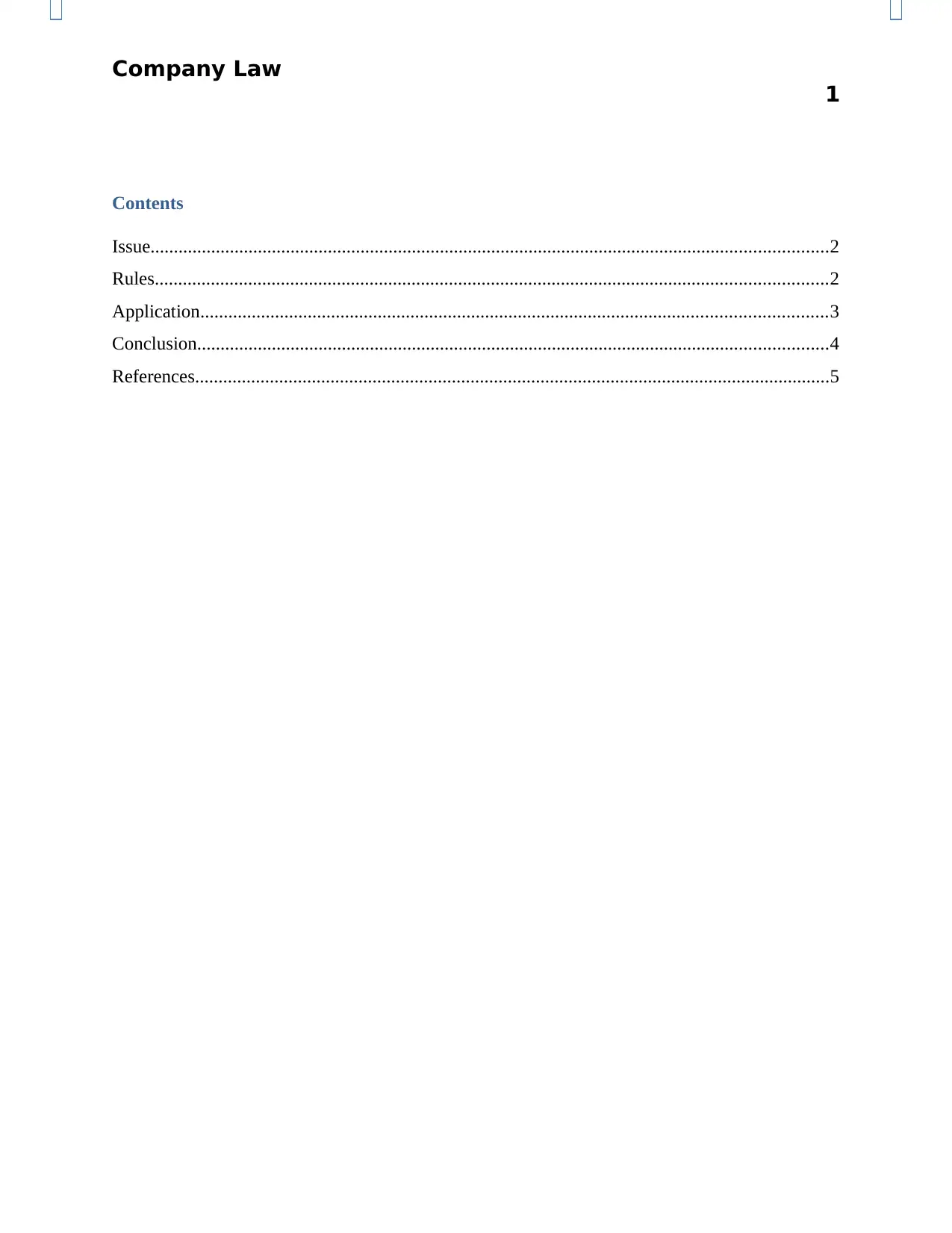
Company Law
1
Contents
Issue.................................................................................................................................................2
Rules................................................................................................................................................2
Application......................................................................................................................................3
Conclusion.......................................................................................................................................4
References........................................................................................................................................5
1
Contents
Issue.................................................................................................................................................2
Rules................................................................................................................................................2
Application......................................................................................................................................3
Conclusion.......................................................................................................................................4
References........................................................................................................................................5
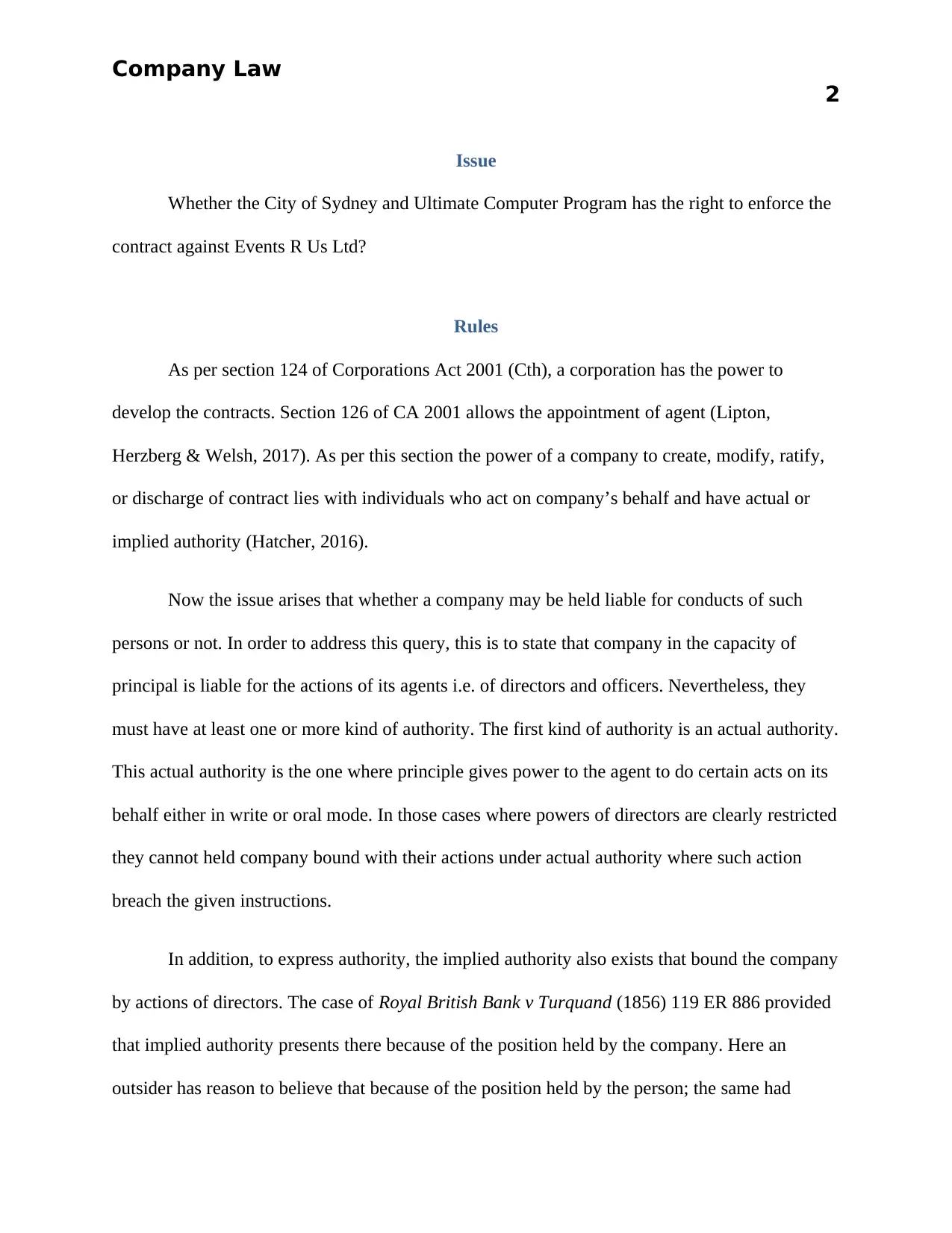
Company Law
2
Issue
Whether the City of Sydney and Ultimate Computer Program has the right to enforce the
contract against Events R Us Ltd?
Rules
As per section 124 of Corporations Act 2001 (Cth), a corporation has the power to
develop the contracts. Section 126 of CA 2001 allows the appointment of agent (Lipton,
Herzberg & Welsh, 2017). As per this section the power of a company to create, modify, ratify,
or discharge of contract lies with individuals who act on company’s behalf and have actual or
implied authority (Hatcher, 2016).
Now the issue arises that whether a company may be held liable for conducts of such
persons or not. In order to address this query, this is to state that company in the capacity of
principal is liable for the actions of its agents i.e. of directors and officers. Nevertheless, they
must have at least one or more kind of authority. The first kind of authority is an actual authority.
This actual authority is the one where principle gives power to the agent to do certain acts on its
behalf either in write or oral mode. In those cases where powers of directors are clearly restricted
they cannot held company bound with their actions under actual authority where such action
breach the given instructions.
In addition, to express authority, the implied authority also exists that bound the company
by actions of directors. The case of Royal British Bank v Turquand (1856) 119 ER 886 provided
that implied authority presents there because of the position held by the company. Here an
outsider has reason to believe that because of the position held by the person; the same had
2
Issue
Whether the City of Sydney and Ultimate Computer Program has the right to enforce the
contract against Events R Us Ltd?
Rules
As per section 124 of Corporations Act 2001 (Cth), a corporation has the power to
develop the contracts. Section 126 of CA 2001 allows the appointment of agent (Lipton,
Herzberg & Welsh, 2017). As per this section the power of a company to create, modify, ratify,
or discharge of contract lies with individuals who act on company’s behalf and have actual or
implied authority (Hatcher, 2016).
Now the issue arises that whether a company may be held liable for conducts of such
persons or not. In order to address this query, this is to state that company in the capacity of
principal is liable for the actions of its agents i.e. of directors and officers. Nevertheless, they
must have at least one or more kind of authority. The first kind of authority is an actual authority.
This actual authority is the one where principle gives power to the agent to do certain acts on its
behalf either in write or oral mode. In those cases where powers of directors are clearly restricted
they cannot held company bound with their actions under actual authority where such action
breach the given instructions.
In addition, to express authority, the implied authority also exists that bound the company
by actions of directors. The case of Royal British Bank v Turquand (1856) 119 ER 886 provided
that implied authority presents there because of the position held by the company. Here an
outsider has reason to believe that because of the position held by the person; the same had
⊘ This is a preview!⊘
Do you want full access?
Subscribe today to unlock all pages.

Trusted by 1+ million students worldwide
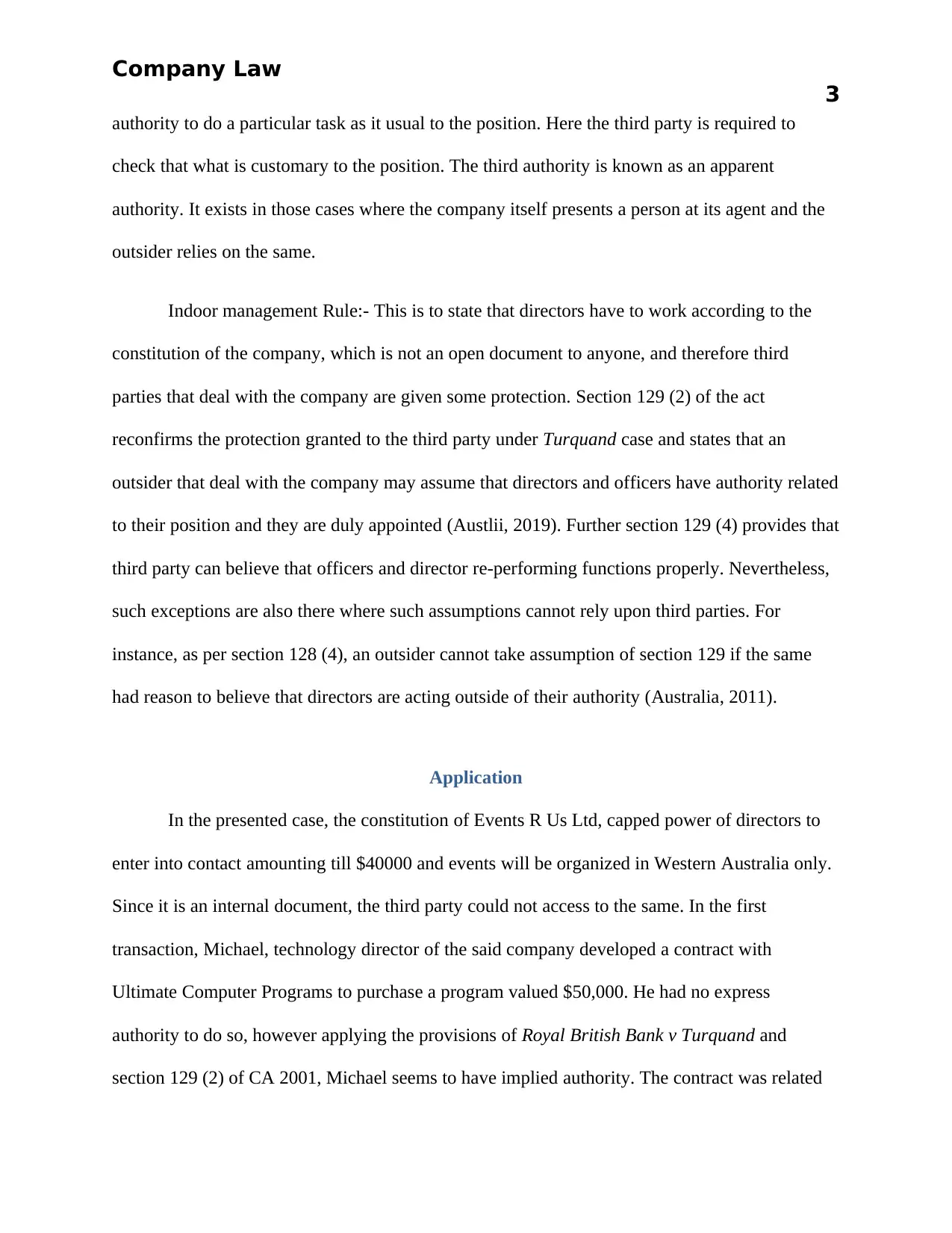
Company Law
3
authority to do a particular task as it usual to the position. Here the third party is required to
check that what is customary to the position. The third authority is known as an apparent
authority. It exists in those cases where the company itself presents a person at its agent and the
outsider relies on the same.
Indoor management Rule:- This is to state that directors have to work according to the
constitution of the company, which is not an open document to anyone, and therefore third
parties that deal with the company are given some protection. Section 129 (2) of the act
reconfirms the protection granted to the third party under Turquand case and states that an
outsider that deal with the company may assume that directors and officers have authority related
to their position and they are duly appointed (Austlii, 2019). Further section 129 (4) provides that
third party can believe that officers and director re-performing functions properly. Nevertheless,
such exceptions are also there where such assumptions cannot rely upon third parties. For
instance, as per section 128 (4), an outsider cannot take assumption of section 129 if the same
had reason to believe that directors are acting outside of their authority (Australia, 2011).
Application
In the presented case, the constitution of Events R Us Ltd, capped power of directors to
enter into contact amounting till $40000 and events will be organized in Western Australia only.
Since it is an internal document, the third party could not access to the same. In the first
transaction, Michael, technology director of the said company developed a contract with
Ultimate Computer Programs to purchase a program valued $50,000. He had no express
authority to do so, however applying the provisions of Royal British Bank v Turquand and
section 129 (2) of CA 2001, Michael seems to have implied authority. The contract was related
3
authority to do a particular task as it usual to the position. Here the third party is required to
check that what is customary to the position. The third authority is known as an apparent
authority. It exists in those cases where the company itself presents a person at its agent and the
outsider relies on the same.
Indoor management Rule:- This is to state that directors have to work according to the
constitution of the company, which is not an open document to anyone, and therefore third
parties that deal with the company are given some protection. Section 129 (2) of the act
reconfirms the protection granted to the third party under Turquand case and states that an
outsider that deal with the company may assume that directors and officers have authority related
to their position and they are duly appointed (Austlii, 2019). Further section 129 (4) provides that
third party can believe that officers and director re-performing functions properly. Nevertheless,
such exceptions are also there where such assumptions cannot rely upon third parties. For
instance, as per section 128 (4), an outsider cannot take assumption of section 129 if the same
had reason to believe that directors are acting outside of their authority (Australia, 2011).
Application
In the presented case, the constitution of Events R Us Ltd, capped power of directors to
enter into contact amounting till $40000 and events will be organized in Western Australia only.
Since it is an internal document, the third party could not access to the same. In the first
transaction, Michael, technology director of the said company developed a contract with
Ultimate Computer Programs to purchase a program valued $50,000. He had no express
authority to do so, however applying the provisions of Royal British Bank v Turquand and
section 129 (2) of CA 2001, Michael seems to have implied authority. The contract was related
Paraphrase This Document
Need a fresh take? Get an instant paraphrase of this document with our AI Paraphraser
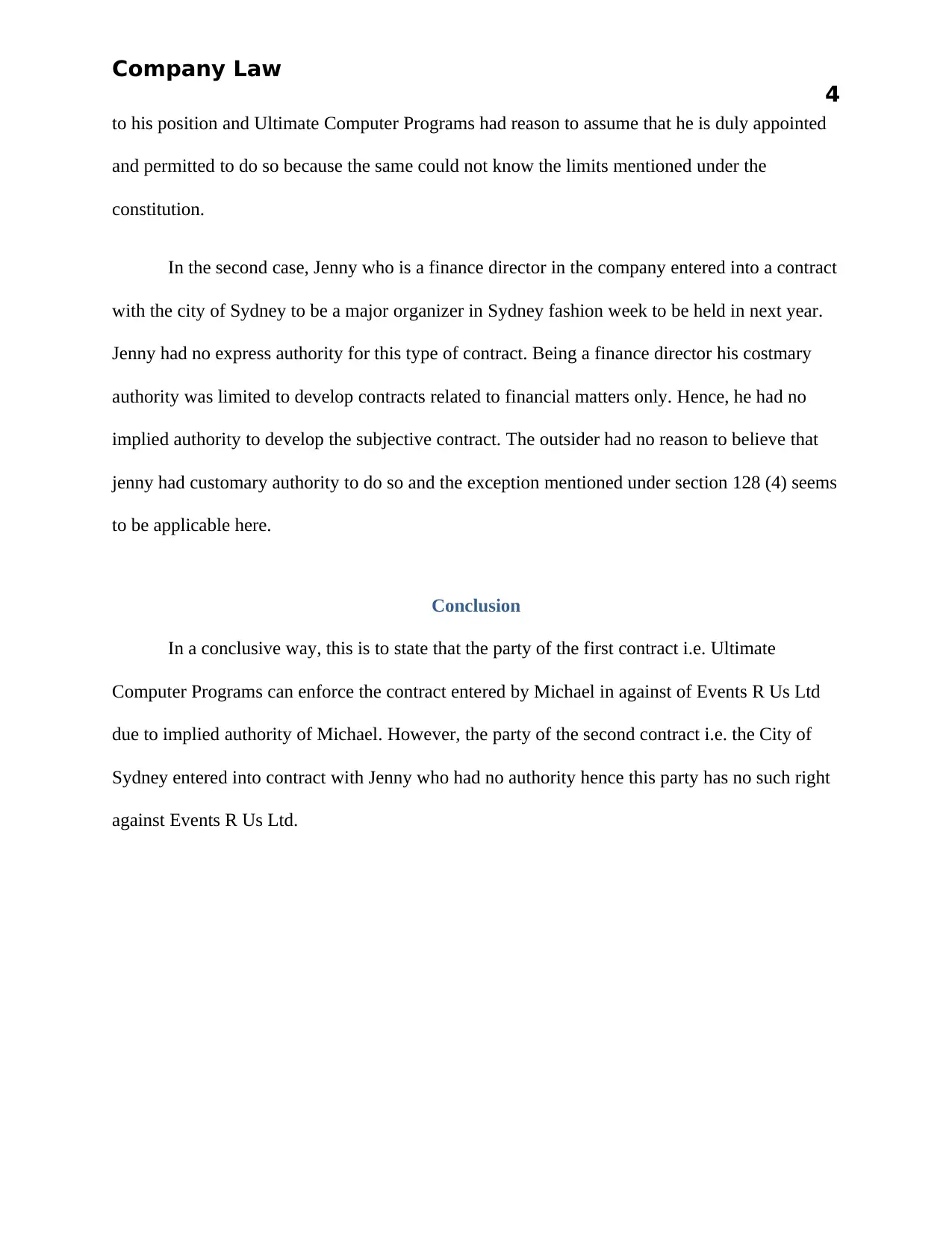
Company Law
4
to his position and Ultimate Computer Programs had reason to assume that he is duly appointed
and permitted to do so because the same could not know the limits mentioned under the
constitution.
In the second case, Jenny who is a finance director in the company entered into a contract
with the city of Sydney to be a major organizer in Sydney fashion week to be held in next year.
Jenny had no express authority for this type of contract. Being a finance director his costmary
authority was limited to develop contracts related to financial matters only. Hence, he had no
implied authority to develop the subjective contract. The outsider had no reason to believe that
jenny had customary authority to do so and the exception mentioned under section 128 (4) seems
to be applicable here.
Conclusion
In a conclusive way, this is to state that the party of the first contract i.e. Ultimate
Computer Programs can enforce the contract entered by Michael in against of Events R Us Ltd
due to implied authority of Michael. However, the party of the second contract i.e. the City of
Sydney entered into contract with Jenny who had no authority hence this party has no such right
against Events R Us Ltd.
4
to his position and Ultimate Computer Programs had reason to assume that he is duly appointed
and permitted to do so because the same could not know the limits mentioned under the
constitution.
In the second case, Jenny who is a finance director in the company entered into a contract
with the city of Sydney to be a major organizer in Sydney fashion week to be held in next year.
Jenny had no express authority for this type of contract. Being a finance director his costmary
authority was limited to develop contracts related to financial matters only. Hence, he had no
implied authority to develop the subjective contract. The outsider had no reason to believe that
jenny had customary authority to do so and the exception mentioned under section 128 (4) seems
to be applicable here.
Conclusion
In a conclusive way, this is to state that the party of the first contract i.e. Ultimate
Computer Programs can enforce the contract entered by Michael in against of Events R Us Ltd
due to implied authority of Michael. However, the party of the second contract i.e. the City of
Sydney entered into contract with Jenny who had no authority hence this party has no such right
against Events R Us Ltd.
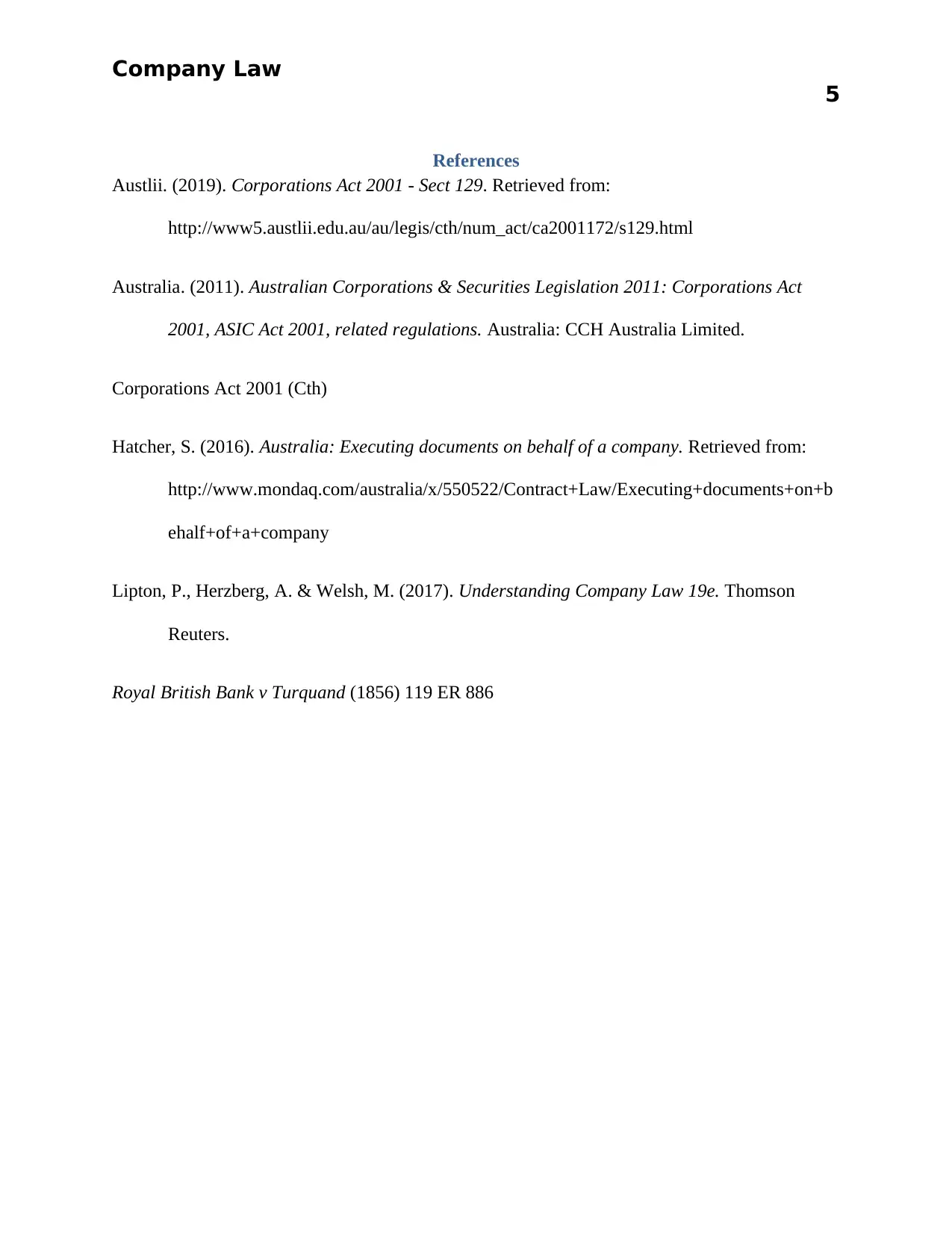
Company Law
5
References
Austlii. (2019). Corporations Act 2001 - Sect 129. Retrieved from:
http://www5.austlii.edu.au/au/legis/cth/num_act/ca2001172/s129.html
Australia. (2011). Australian Corporations & Securities Legislation 2011: Corporations Act
2001, ASIC Act 2001, related regulations. Australia: CCH Australia Limited.
Corporations Act 2001 (Cth)
Hatcher, S. (2016). Australia: Executing documents on behalf of a company. Retrieved from:
http://www.mondaq.com/australia/x/550522/Contract+Law/Executing+documents+on+b
ehalf+of+a+company
Lipton, P., Herzberg, A. & Welsh, M. (2017). Understanding Company Law 19e. Thomson
Reuters.
Royal British Bank v Turquand (1856) 119 ER 886
5
References
Austlii. (2019). Corporations Act 2001 - Sect 129. Retrieved from:
http://www5.austlii.edu.au/au/legis/cth/num_act/ca2001172/s129.html
Australia. (2011). Australian Corporations & Securities Legislation 2011: Corporations Act
2001, ASIC Act 2001, related regulations. Australia: CCH Australia Limited.
Corporations Act 2001 (Cth)
Hatcher, S. (2016). Australia: Executing documents on behalf of a company. Retrieved from:
http://www.mondaq.com/australia/x/550522/Contract+Law/Executing+documents+on+b
ehalf+of+a+company
Lipton, P., Herzberg, A. & Welsh, M. (2017). Understanding Company Law 19e. Thomson
Reuters.
Royal British Bank v Turquand (1856) 119 ER 886
⊘ This is a preview!⊘
Do you want full access?
Subscribe today to unlock all pages.

Trusted by 1+ million students worldwide
1 out of 6
Related Documents
Your All-in-One AI-Powered Toolkit for Academic Success.
+13062052269
info@desklib.com
Available 24*7 on WhatsApp / Email
![[object Object]](/_next/static/media/star-bottom.7253800d.svg)
Unlock your academic potential
Copyright © 2020–2026 A2Z Services. All Rights Reserved. Developed and managed by ZUCOL.





